Covid: How the coronavirus pandemic is redefining Scottish politics
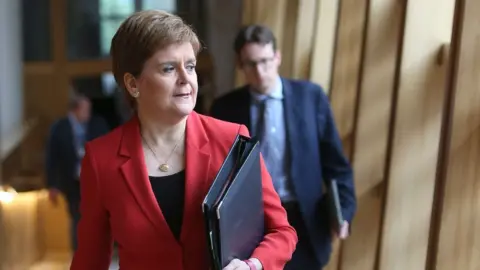 Getty Images
Getty ImagesThe pandemic has probably done more than anything to define Scottish devolution in 21 years of Holyrood decision making.
Before coronavirus, the Scottish Parliament's policy choices - from free personal care for the elderly to minimum pricing of alcohol - made it distinctive.
Now, Scottish ministers are making life and death decisions affecting everybody almost every day.
The exercise of emergency powers to combat Covid-19 commands public attention like nothing before.
We've had six months of lockdown restrictions and after a recent period of relaxation, they are tightening again as coronavirus cases rise.
It is First Minister Nicola Sturgeon rather than the prime minister, Boris Johnson, who is deciding for Scotland because public health is devolved.
Many of her decisions so far have matched those by the UK government for England and the devolved administrations for Wales and Northern Ireland.
That was especially true in the early stages of the crisis when there was much talk of a four nations approach.
It continues, to some extent, with a 10pm curfew on bars and restaurants being imposed across Britain (with Northern Ireland yet to decide) but there are differences too.
The Scottish government has generally been more cautious about lifting restrictions than the UK government.
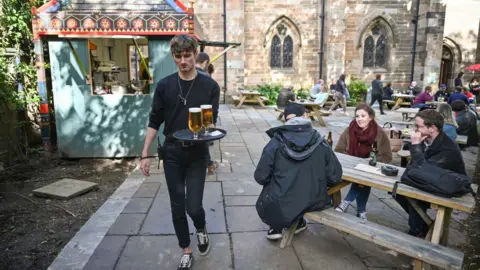 Getty Images
Getty ImagesBars and restaurants stayed closed in Scotland for longer and it was slower to lift quarantine for people arriving from Spain, before this was reimposed across the UK.
By contrast, the Scottish government was the first in the UK to restore full-time classroom education in schools after the summer.
This is devolved decision making in action as never before.
Some argue divergence across the UK is confusing and undesirable but opinion polls consistently suggest the Scottish public trust Holyrood to set the pace.
After a period in which Conservatives argued that Scotland should leave lockdown in lockstep with the rest of the UK, a multi-speed approach became accepted.
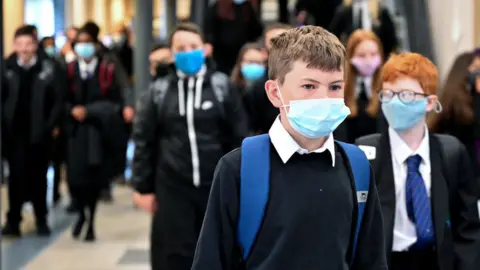 Getty Images
Getty ImagesThe pandemic, however unwanted, has given Nicola Sturgeon an opportunity to demonstrate leadership. She has been highly visible, personally fronting most of nearly 150 televised briefings.
Boris Johnson has been more inclined to delegate to other ministers and was forced to do so for an extended period when he became seriously ill with the virus.
An Ipsos Mori survey for BBC Scotland in May suggested 82% of people thought Ms Sturgeon was handling the pandemic either very or fairly well.
By contrast, only 30% from the same sample of around 1,000 Scottish adults gave Boris Johnson similar credit.
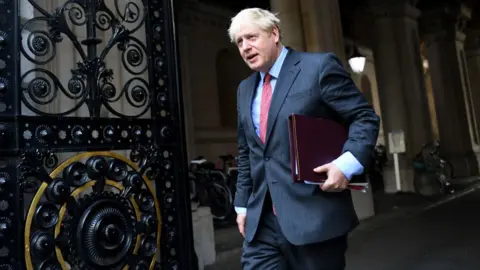 Getty Images
Getty ImagesMore recent polling has produced similar indications even although coronavirus outcomes are not profoundly different between the UK nations.
The Office for National Statistics reported that England had the highest increase in excess deaths in Europe to the end of May. At that point, Scotland had the third highest behind Spain.
While politicians of all stripes have been working to suppress coronavirus, coronavirus has suppressed much of our everyday politics.
Previous Holyrood priorities like completing an expansion of free childcare, introducing new devolved benefits and reviewing the school curriculum have been deferred.
Major controversies such as the Scottish government's mishandling of complaints about the behaviour of the former first minister, Alex Salmond, seem less potent.
Independence referendum
The Scottish government parked preparations for an independence referendum in 2020 to prioritise its response to the pandemic.
That has not meant opinion on the major constitutional question in Scottish politics has remained static.
As coronavirus has swept the country, a trend has emerged in opinion polls suggesting there is now majority support in Scotland for independence.
Some analysts suggest this could be directly linked to the focus on devolved leadership in the crisis.
The trend has worried Conservatives enough to change their Scottish party leader and some in Scottish Labour have unsuccessfully tried to change theirs.
Those who favour the union point out that Scotland has been supported by what they call the "broad shoulders" of the UK economy throughout the pandemic.
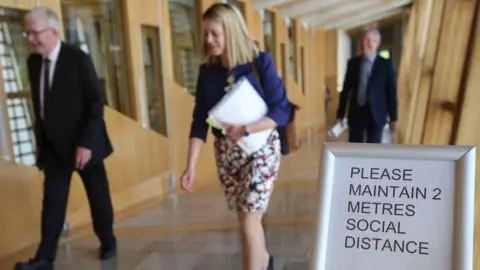 PA Media
PA MediaLockdown is largely underwritten by the Treasury with huge funding for furlough and other schemes to support business.
Nationalists say this help would be replicated by Holyrood if it had the economic powers of independence.
Unionists question the scope for doing so in a country which, as a devolved part of the UK, had a notional deficit of £15bn before the pandemic took full effect.
Economics will always be important in the debate over independence as will the public's sense of identity.
In the 2014 referendum, Scotland voted 55%-45% for continued union. If indyref2 was held tomorrow, the polls suggest the result would go the other way.
There is much that could sway opinion further - both for and against independence - in the coming months.
The economic crisis the pandemic brings, the impact of Brexit and the efforts of politicians to overcome the continuing health emergency could all have a bearing.
The public could weary of politicians telling them what they can and can't do especially if their livelihoods are on the line.
Arguments over all this and more will find expression in the campaign for next May's Holyrood elections.
Together with elections to the Welsh Assembly and local government in England, these will be the first major votes of the pandemic.
A pandemic that has already given new definition to devolved power and could be playing a role in shaping opinion on the future of the Union
